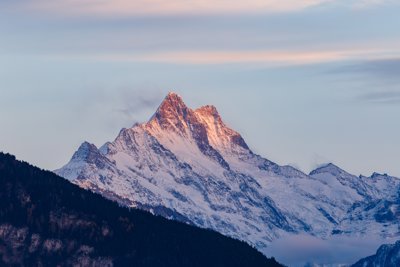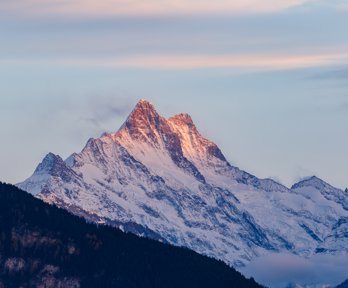The aim of this module is to provide a foundation for understanding glaciation and geological timescales that satisfies the Key Stage 3 requirements while also preparing students for further study of these topics if they choose to continue with geography beyond Key Stage 3. The majority of the module is focused on glaciers and glaciation, but two of the lessons deal specifically with aspects of geology and geological time. Throughout the module, students should be encouraged to make links between the two topics wherever possible. From a teaching point of view, glaciation and geological time make a good pairing given the relatively long timescales over which glacial processes operate, especially when viewed in relation to Ice Age changes; and students should find study of the two topics mutually reinforcing.
An icy World: Glaciers and glacial environments
The first lesson begins with a look at what is meant by the ‘cryosphere’ – a term which students may not have encountered before, but which is important for understanding cold environments in general. Important distinctions are drawn, for example between sea ice and ice shelves and between polar and alpine climates. This prepares the way for understanding what glaciers are and how they relate to other aspects of the Earth’s environment. Most of the lesson concentrates on the different types of glaciers and their global distribution.
Not an ice cube: how glaciers work
Lesson two focuses on the nature of glacier ice and how glaciers work (as systems), and lesson three focuses on the way that glaciers shape landscapes through erosion, transport, and deposition. There are downloadable task sheets to help students learn the related terminology as well as tasks that help students to understand how the concepts can be explored through observation and fieldwork.
How glaciers shape the land and what they leave behind
In Lesson three students are encouraged to ‘think like a geographer’ in the sense of learning ‘how to read a landscape’ (in this case a glaciated one) for clues as to why a landscape looks the way it does.
Ice Ages and geological timescales
It is in lessons four and five where the timescale dimension of the module takes prominence. Lesson four both explains what is meant by an Ice Age and how Ice Ages fit into the broader sweep of geological time. Students are also introduced to the formal Geological Timescale used by geologists and its major features and subdivisions. The main aims here are to give students an appreciation of the enormity of geological time, an introduction to the great changes that have occurred during the recent Ice Age, and an understanding of how the current ‘postglacial’ climate we experience now compares with the peak of the Ice Age and earlier times in Earth’s history.
London: its geological journey and heritage
Lesson five, on London’s geology, takes some of the general concepts explored in lesson four and applies them to thinking about how the area of London has changed over geological timescales and how this relates to the rocks that underlie and surround the city.
The Ice Age postponed? Impacts of melting ice in a warming world
Lesson six makes the link between the topics of glaciation and contemporary climate change. Having gained an understanding of how glaciers work from lesson two, students should be able to see quite easily why glaciers are monitored by scientists to track global warming. The lesson both presents evidence for how glaciers (and the cryosphere in general) have been changing in recent decades and explains why shrinking glaciers matter for people. Human impacts are also studied in terms of their type (social, economic, environmental, political) and scale (local, regional, global).
Glaciation and geological timescales together form a large area of study that can, in places, be quite technical and specialised. This module attempts to convey the key ideas in an accessible way (although students may find lessons four and five more challenging conceptually than the others) and to provide teachers with a range of different resources that they can draw upon.
Weblinks
Glacial environments KS3 resources module
Glacial landscapes KS5 resources module
Discovering Antarctica website
About the author
Dr David Anderson is Head of Geography at Eton College. His doctoral research at the University of Oxford involved reconstructing past environmental and climatic changes from stratigraphic evidence. He is the author of the A-level text Glacial and Periglacial Environments (Hodder) and a co-author of Global Environments through the Quaternary: Exploring Environmental Change (OUP). He also co-authored the A-level section of the Discovering Antarctica website for the RGS-IBG.


